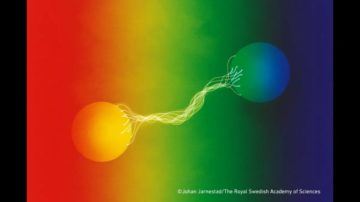Ethan Siegel at Big Think:
 For generations, scientists argued over whether there was truly an objective, predictable reality for even quantum particles, or whether quantum “weirdness” was inherent to physical systems. In the 1960s, John Stewart Bell developed an inequality describing the maximum possible statistical correlation between two entangled particles: Bell’s inequality. But certain experiments could violate Bell’s inequality, and these three pioneers — John Clauser, Alain Aspect, and Anton Zeilinger — helped make quantum information systems a bona fide science.
For generations, scientists argued over whether there was truly an objective, predictable reality for even quantum particles, or whether quantum “weirdness” was inherent to physical systems. In the 1960s, John Stewart Bell developed an inequality describing the maximum possible statistical correlation between two entangled particles: Bell’s inequality. But certain experiments could violate Bell’s inequality, and these three pioneers — John Clauser, Alain Aspect, and Anton Zeilinger — helped make quantum information systems a bona fide science.
More here.
